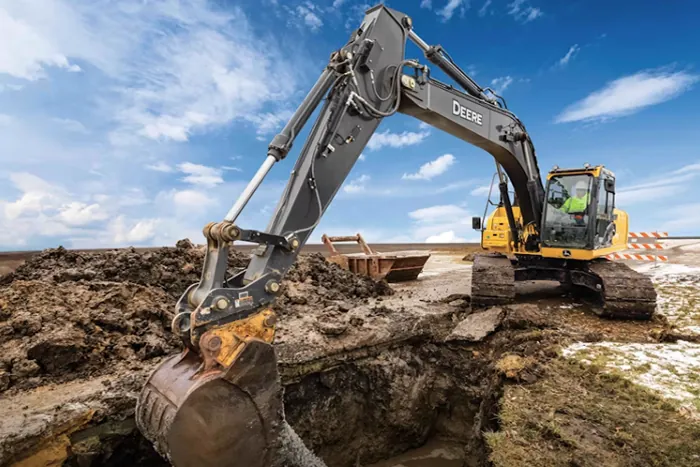Causes and Solutions for High Hydraulic Oil Temperature in Excavators

When the excavator is working, the power output from the engine is mainly used to excavate earth, and part of the power is converted into heat energy to be absorbed by the hydraulic components, increasing the temperature of the hydraulic system. Through equipment such as coolers, hydraulic oil tanks, and piping, the heat is emitted into the air. Excavators work best when the temperature of the hydraulic fluid is kept between 50 and 80°C. However, when the temperature exceeds 95℃, the working efficiency will be significantly reduced, and even cause the excavator not to operate normally. The causes of high hydraulic oil temperature can be analyzed from four aspects: hydraulic oil Radiator, hydraulic system, hydraulic oil quality, and driver operation.
Hydraulic oil radiator
(1) Dirt accumulation or fin deformation: hydraulic oil radiator through the suction cooling fan cooling, if the working environment is dusty, the radiator surface is prone to accumulation of impurities, affecting the cooling efficiency. Drivers should regularly clean the outside of the radiator to prevent clogging. In addition, if the fins are deformed, they need to be adjusted in time to improve the cooling effect.
(2) Clogging of internal piping: Wear and tear of hydraulic components will produce impurities that attach to the inside of the radiator, and carbonization of hydraulic oil will form an oil scale, which may lead to complete clogging of the internal piping. By detecting the temperature difference between the inlet and outlet ports or differential pressure, you can determine whether there is a blockage and timely unblocking.
(3) the seal is not tight: the sponge around the radiator can prevent the hot air back, if the sponge is broken or off, the high-temperature air will flow back, reducing the cooling effect, and should be replaced promptly broken sponge.
(4) air-guide device problem: The air-guide cover can improve the efficiency of the fan, if damaged or the fan and air-guide cover gap is too large, the air volume will be reduced, and the cooling efficiency will decrease. When repairing, the gap between the fan and air guide cover and the distance between the radiator core should be kept in line with the standard to ensure the cooling effect.
(5) Loose fan tape: Loose or slippery fan tape will lead to a decrease in cooling effect. The tension of the tape should be checked and adjusted regularly, and replaced with a new tape if necessary.
Hydraulic system
(1) Unreasonable return back pressure: If the back pressure valve or bypass valve fails, the hydraulic oil may not be able to pass through the radiator to cool and flow directly back to the tank, resulting in high oil temperature. These valves need to be checked and repaired to ensure normal operation of the system.
(2) The hydraulic components gap is too large: multi-way valves, pumps, motors, and other hydraulic components gap is too large, which leads to internal leakage, converted into heat, thereby increasing the temperature of the hydraulic oil. Timely maintenance and replacement of worn components can reduce this situation.
(3) unreasonable pressure adjustment: the hydraulic system of the pump, relief valve, and safety valve pressure adjustment is not appropriate, and will lead to increased oil temperature. Too high a pressure will increase the load on the pump, too low will lead to frequent overflow phenomenon. The system pressure should be adjusted to a reasonable range according to different load conditions.
Hydraulic oil
(1) Improper choice of fluid: The selection of inappropriate hydraulic fluid will increase internal leakage or resistance to flow, resulting in power loss. Low-viscosity hydraulic oil should be selected in winter and high-viscosity hydraulic oil in summer to reduce friction loss and leakage.
(2) poor oil quality: hydraulic oil cleanliness is not high or mixed with air will increase system friction, resulting in increased oil temperature. Choose the manufacturer's specified hydraulic oil, and avoid mixing different brands and models of oil.
(3) Insufficient oil: Insufficient oil level in the hydraulic oil tank will lead to heat dissipation difficulties, hydraulic oil should be added promptly to maintain the oil level at 80% of the height of the tank.
Driver operation
Driver's operating habits will also affect the hydraulic oil temperature. If the operation is not consistent or too violent, the hydraulic system is in a high-pressure state for a long time, resulting in a rise in oil temperature. In large load operations, the driver should try to avoid frequent opening of the relief valve, and more compound action to reduce the high temperature of the hydraulic oil.
Through the above analysis, it is vital to control the hydraulic oil temperature within a reasonable range. Drivers should use and maintain the excavator correctly and troubleshoot in time to ensure the normal and efficient operation of the equipment.
Why Choose SAIVS™ as Your Supplier?
Committed to innovation and customer needs, SAIVS specializes in high-quality machinery components for diverse industries like construction, mining, and agriculture. They offer a wide range of parts, including undercarriage components for popular brands, ensuring optimal performance and durability. values customer satisfaction, providing competitive prices, fast shipping, and exceptional service to keep your operations running smoothly.